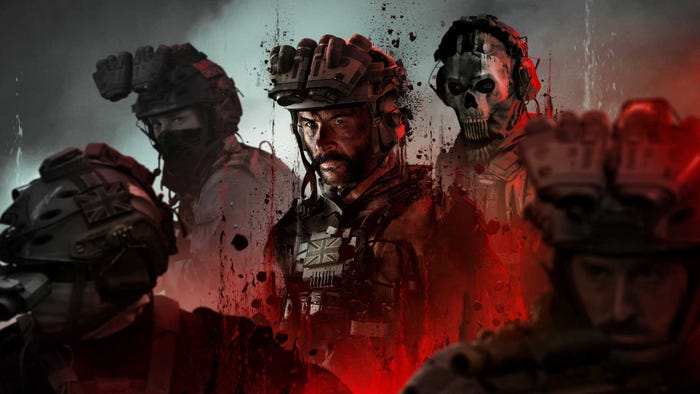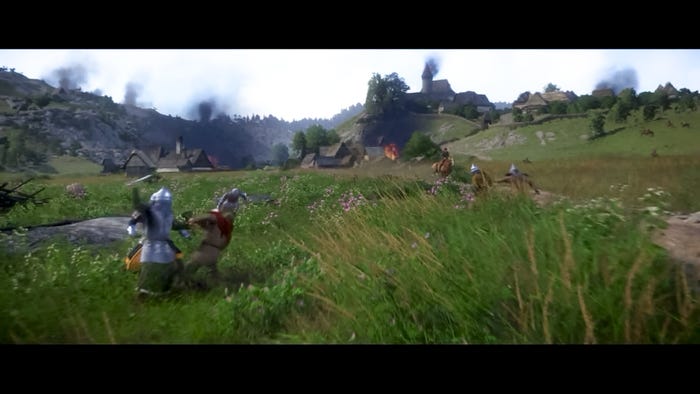Following Douglas Wilson's <a href="http://www.gamasutra.com/php-bin/news_index.php?story=18133">impassioned opinion piece</a> on militant gamers and their defense of games as an artform, writer and student Rene Patnode steps in to respectfully suggest th

[Following Douglas Wilson's impassioned opinion piece discussing why developer and gamers alike should step away from a militant defense of the artform, writer and student Rene Patnode steps in to respectfully suggest that the phrase 'gamer' should not be a dirty word.] Doug Wilson is a personal friend of mine, and therefore I was quite shocked to see his recent opinion article on Gamasutra. I know Wilson to have a very long history of playing video games and to be very knowledgeable about them in all aspects historical, cultural, and technical. In short, I would not hesitate to call him a gamer, nor would I do as he does and hesitate to call myself a gamer. I am, moreover, proud to do so. In fact, when I first read Doug’s article, I was wearing a t-shirt that had no design save for the affirmative statement “gamer.” I’m a sociologist by training, and I’m very interested in the topic of sub-cultures whether one is speaking of gamers or any other group. As such, I believe that Wilson incorrectly chastises the totality of the gamer sub-culture while correctly criticizing unfortunate behavior of certain members of that sub-culture. I would like to offer a rebuttal on behalf of gamers everywhere while pointing out what I feel to be valid concerns in Wilson’s argument. A Matter of Culture To begin with, I fundamentally disagree with Wilson’s program to dismantle the gamer sub-culture. Foremost, it is not such an easy task as he seems to suggest. I identify as a gamer because there are certain life experiences I share with other people who also play video games. Among these: learning to blow into an NES cartridge if it stopped working, throwing water on the dragon in King’s Quest I, and fiddling with QBasic trying to program my own games. If I speak of these things to another gamer, I can assume a level of understanding that I would not find elsewhere. Granted, these examples are old, but even if were speaking to a younger player, there would still be some degree of commonality: we would hold the same awe for people who have mastered “Through the Fire and the Flames.” Hell, I was ecstatic the day I managed to get 100% on that song on easy difficulty, which at that time was quite non-trivial for my clumsy fingers. My point here is that dropping the term “gamer” from our vocabulary would in no way deconstruct the essence of the culture to which it refers. It is a useful term that signifies something real. Wilson’s analysis does point to the fact that this essence of the gamer culture may change even if it is not outright obliterated. I couldn’t agree more. What changes is the specific knowledge that constitutes the boundaries of the culture. There was a time when knowledge of arcane commands was essential to even start a game. I began playing PC games when it was still necessary to fine-tune one’s autoexec.bat and config.sys to get a game running. Nowadays, the wonders of plug-and-play (and anyone who was around for Windows 95 is now laughing) have mitigated the importance of that knowledge. Arcades and consoles, of course, have always been plug-and-play in a manner of speaking, but as everyone knows they used to have their own tactic of exclusion: old games are generally much harder than those of today. Wilson’s comparison to TV is therefore not quite accurate; there has never been anything exclusive in the practice of TV watching. No special knowledge was ever required. Different shows may develop independent fan bases, but that is not what Wilson is addressing here. At most, the cost of a television set might limit those who can purchase one, but then it becomes a question of class, not sub-culture. With contemporary games becoming more accessible for a variety of reasons, and the requisite knowledge requirements becoming lowered, more and more people will start to identify themselves as gamers. Some of these latecomers may then ironically resist the enlargement of the gaming fold. A Matter of Identity In so far as gamers self-identify as members of this sub-culture, any challenge to the constitution of the sub-culture necessarily challenges the identity of the members. More specifically, the fact that parents and grand-parents may become gamers thanks to Wii Sports is frightening. Not only do parents just not understand, we don’t want them to understand, as their understanding changes that which is understood. But, as Wilson suggests, this fear may be irrational. While I agree that it may be in our best interests to continue the process of opening up gamer culture, I stop short, however, of using the reticence of gamers to do so as an indictment of the whole sub-culture. If it were, every other sub-culture (or at least those attached to popular culture) would almost certainly be guilty of the same sin. Within music, fans often speak of some band having sold out. I remember the fury I felt when I was watching VH1’s Behind the Music and Metallica’s Lars Ulrich responded to critics with “yeah, we sell out... every concert.” I felt, and I imagine others felt, cheated by Mr. Ulrich. Our years of dedication to the band were not being respected. But Metallica didn’t listen. They continued with their new direction and brought in new fans; old fans went and found new bands. In the end, everyone was happy. For another example, two words: Jar-Jar Binks. In the final analysis, change to the fan sub-culture appears inevitable, but yet so are reactionary responses from the fans. But those responses are soon swallowed up by the progress of the sub-culture on the whole. Given this inevitability, is there reason for concern? After all, the course of history has already begun to unfold. In the same way we gaming old-timers may look down on PlayStation fanboys (for the record, I’m a Nintendo man), those same gamers who cut their teeth on the PS2 may denigrate the n00bs who are just learning to waggle their Wii-motes. Wilson’s critique may in fact stem from his own nostalgia for the good old days before a series of tubes became the internet we now know and love, and flame wars became easier to ignite. A Matter of Maturity I do think Wilson was correct to note the immaturity that plagues a good portion of the gaming community as it tries to navigate the current phase of its development. I think we are all familiar with the kind of language that one might encounter on Xbox Live or in internet forums. At best it may be obscene; at worst, it is racist, misogynist, or homophobic. If you visit Kotaku or similar sites and read the comments posted in response to Wilson’s article you will encounter such kind of retorts nestled among those with far greater nuance. Once again, I know Wilson personally, and I can confirm that he is neither an idiot nor a feminine hygiene product. Unfortunately such accusations only serve to confirm Wilson’s thesis. To the individuals who have written in this way, I will answer directly: there are more effective ways to respond to someone with whom you disagree. (Which means: please don’t flame me also!) I believe that gamers had every right to be angry with Cooper Lawrence and Kevin McCullough. Just because they are symptoms of a greater malady does not absolve them of their culpability. They are professionals after all, and they have some degree of professional responsibility. Further, gamers, as a sub-culture, have no less right to defend the perceived honor of their culture than any other group has. I too long for a day when video gaming is not treated as an infantile pastime, and a change in the popular consciousness regarding gamers is only likely to occur if more and more gamers assert their identity as valid. It is rather unfortunate that those gamers most likely to assert themselves may be exactly those most prone to engaging in ad hominem arguments. It is this minority (the stereotype) that Wilson is truly addressing; let the others come forward to show him that he is wrong. Likewise, I too have been guilty of declaring Hillary Clinton’s disdain for games as one of my reasons for not supporting her. I do so not because I think video games are necessarily the most important thing in the world or even in my life but because I do not trust anyone who would so blindly accept reactionary dogma. She is guilty of no more and no less than Lawrence and McCullough but her influence has the potential to be far greater, and so I find it difficult to put my faith in her to break away from the status quo and lead the United States in the direction it needs. Conversely, I do not find Barack Obama’s comments related to games to be of the same magnitude, and thus he still receives my support. But I recognize that other individuals (including other gamers) might think differently than I do. They may even vote Republican, and I respect that choice even if I don’t agree with it. A Matter of Respect If we gamers wish to be respected as a sub-culture, we must all learn how to respect those whose opinions differ. Gamers should not think they have the right to respond in whatever immature fashion they choose. If nothing else, their methods only provide more fuel to the proverbial fire. Fortunately, both Lawrence and McCullough have retracted their positions somewhat, but the methods that some gamers used to influence those retractions are unlikely to dissuade new critics from sprouting up. If Clinton does in fact win the nomination and then the election, I hope some of my peers will think twice before they assault the internet with incendiary remarks. Otherwise she will be even less likely to see the error of her ways and to divert her anti-game agenda. Historically, it is important to realize that media other than video games have been subject to criticism by uninformed pundits. In addition to being a gamer, I am proud to call myself a fan of The Simpsons, which I have watched since the very first season. At that time, the show was in very much the same boat as games find themselves now; it was blamed for the downfall of the morality of American youth. Nearly twenty years later, The Simpsons are broadly hailed as one of the all-time achievements of the small screen. Granted, anti-Simpsons sentiment did not obtain the same political visibility; as far as I know no legislation was threatened that would have affected its production. Nor did it have to contend with an accusation as pointed as that which says video games are murder simulations. Yet, more generally, we’ve been here before. And survived. I may wish, as Wilson does, that gamers were more politically active in issues that don’t involve gaming. But how can I discern from a forum post on a gaming blog anything but what a gamer thinks when she’s reading a gaming blog? Expecting her to write anything that’s not game-related is unreasonable. She may, like me, go from reading Blue’s News to the New York Times. Or she might not, which is also her right. I, the observer, cannot know for certain unless I administer some kind of large-scale survey of gamers that measures political awareness. (Hmm, I’m a sociologist... maybe I should do that!) However, even if the results of such a survey were disappointing, it would not necessarily point to the political apathy of gamers so much as it might point to the political apathy of Americans in general. I’m not sure I agree gamers should be held to a higher standard. In conclusion, I would like to declare my whole-hearted belief that gamers are worthy of respect. I also believe that history has shown that the larger American culture will come to respect us as it has most other sub-cultures. But the trick here is that the respect will come more quickly if we gamers let it. In this aspect, I think Wilson and I are in agreement.
About the Author(s)
You May Also Like








